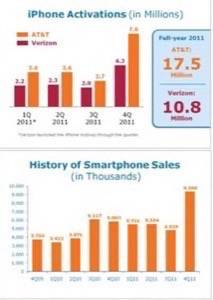AT&T’s worst nightmares may about to become a reality. After user Matthew Spaccarelli successfully sued the U.S. wireless carrier in a California small claims court over the speed throttling of his unlimited data plan, the doors were thrown open for thousands of users across the country to take similar actions. On Monday, five more users will file small claims suits against AT&T using Spaccarelli’s model.

The push to bring small claims cases against AT&T is being driven by a company called PublikDemand that says it strives to “give consumers voice against large corporations.” PublikDemand seems a little bit like ambulance chasers looking to make money against large corporations but the fact of the matter is that Spaccarelli created a blue print of success and followers are an inevitable consequence.

Research
PublikDemand has a blog post outlining how to sue AT&T over data throttling chargers. The first thing you are going to need is a signed copy of your AT&T contract. In the contract, find the applicable section that promises unlimited data speeds and make sure that it is highlighted for court when you file your claim.
The next step is to find your jurisdiction. PublikDemand recommends using this list to find the appropriate courthouse. After you file you are going to need to notify AT&T.
That will lead to a “discovery” process where each side of the suit is given pertinent information from the other side. That means you are going to need to hand over your research to AT&T and they must give you pertinent information (about cell towers and speeds in your area) at the same time.
It is a good idea to keep track of your data usage on a monthly basis whether or not you are planning on suing one of the largest mobile carriers in the world. You can track your data usage directly through AT&T by calling *3282# (*Data#) or by using applications like Norton Mobile Utilities Beta on an Android device. Before “clarifying” its policy yesterday, AT&T had been throttling the top 5% of users in an area that meant that many people were seeing their speeds throttled after about 2 GB of use. From my own personal experience, I had not been throttled by AT&T after 2.5 GB of use in the Boston area but different areas had different limits. AT&T will now throttle users after 3 GB on HSPA networks and 5 GB on LTE networks.
Next, research your data speeds. AT&T increased the speed of users that have been throttled in recent weeks but it is an interesting exercise to check your speeds anyway. PublikDemand recommends Speedtest or Glasnost for this purpose. Document your un-throttled speed and then your throttled speed. Spaccarelli went from, “0.13Mbps, versus a normal rate of 3.46Mbps” in his research.
As in any court case, the more prepared you are, the better chance you will have for success.
Prove Economic Damage
In any claims court, you are going to have to prove actual damage. This may be harder to do than you might imagine. The onus is on the plaintiff to prove that their life, work or day-to-day financial activities were harmed because of the data throttling. Spaccarelli proved his point by pointing to the fact that he streamed Netflix through his phone (which he hooked up to a projector) and that the throttling caused him to not be able to use a service that he paid for. Streaming Spotify (at $9.99 a month for mobile devices) could also be an example of this.
There is danger in following Spaccarelli’s example though. Foremost, you are going to need to pay between $40 and $80 to file the claim and if you lose, that is a cost you are going to have to eat. Also, Spaccarelli is an extreme edge case user of AT&T’s network. He jailbroke his iPhone and used it as a data connection for his other devices along with the Netflix streaming. Really, nobody streams ALL of their movies and television on mobile devices.
Your case will likely not succeed if you have only been throttled once in your history. The best advice is to only proceed if you find that AT&T’s policy hurt you on a consistent basis. The company will also likely counter that it has plenty of options available for consumers on tiered data plans. AT&T wants nothing more than to move all of its users off the grandfathered legacy unlimited data plans, which makes up about 17% of all its subscribers. Yet, the premise of the suit is that you, as a consumer, signed a contract that promised unlimited data at speeds commensurate to “the fastest network in the country,” as AT&T advertises.
Pitfalls
Foremost, when you are bringing a case in small claims court, you are not allowed a lawyer. Sure, you can get legal advice but an outside source but the claim is yours alone. That means that to win a claims suit against a company like AT&T, you are going to need to be extremely well prepared. Spacarrelli researched his case for three months before filing it in Semi Valley, Calif. on Jan. 9, 2012. The flipside of that is that AT&T will not be allowed to send a team of lawyers after you. In Spaccarelli’s case he was opposed by an AT&T area sales manager.
The AT&T contract will be key. AT&T will contend that the contract is the binding agreement between the users and the carrier and in that contract there are provisions citing acceptable use and policies that protect the carrier from lawsuits. With yesterday’s clarification of the data throttling policy it is unclear how that new information will be viewed by a claims court on a case-by-case basis. There are no legal precedents set in claims court so each case is individual to others that have been filed. Last year the Supreme Court upheld a provision in AT&T’s contract that prohibits class-action lawsuits to be filed. So, you will be alone in your quest.
What do you think of PublikDemand’s blue print? Do they seem like ambulance chasers trying to squeeze money from a large corporation or an altruistic group of individuals fighting for the voice of the downtrodden consumer? Let us know in the comments.
Update:
So, Spaccarelli called AT&T wondering when he will get his $850 and PublikDemand filmed it. Below is the video that resulted.









